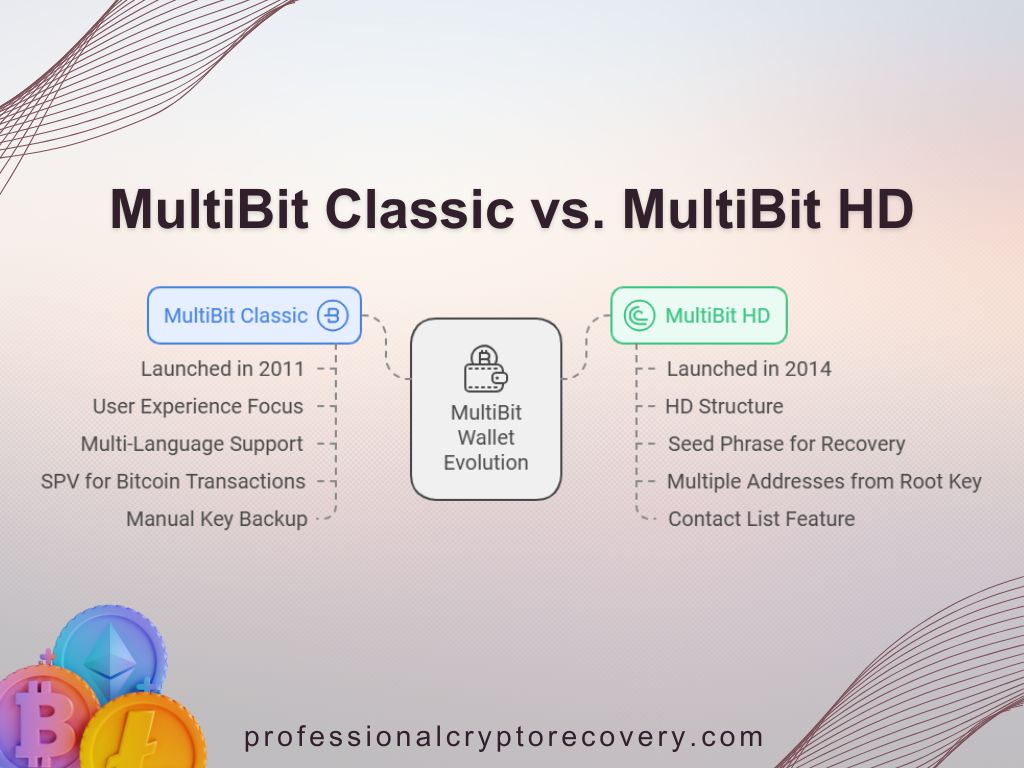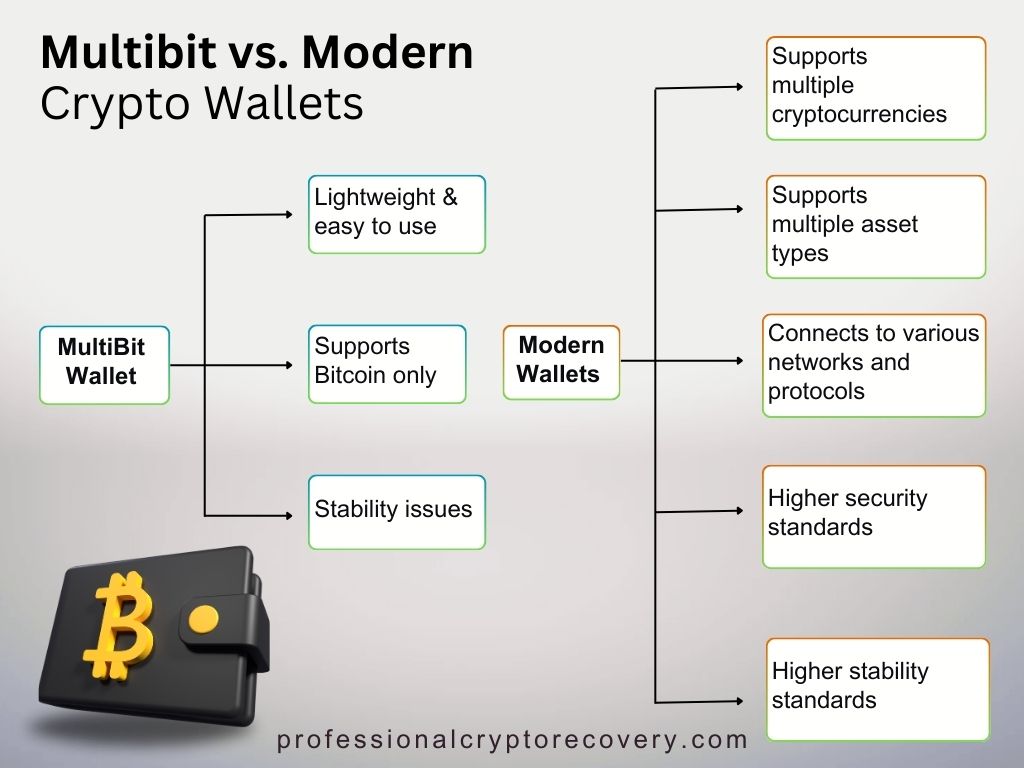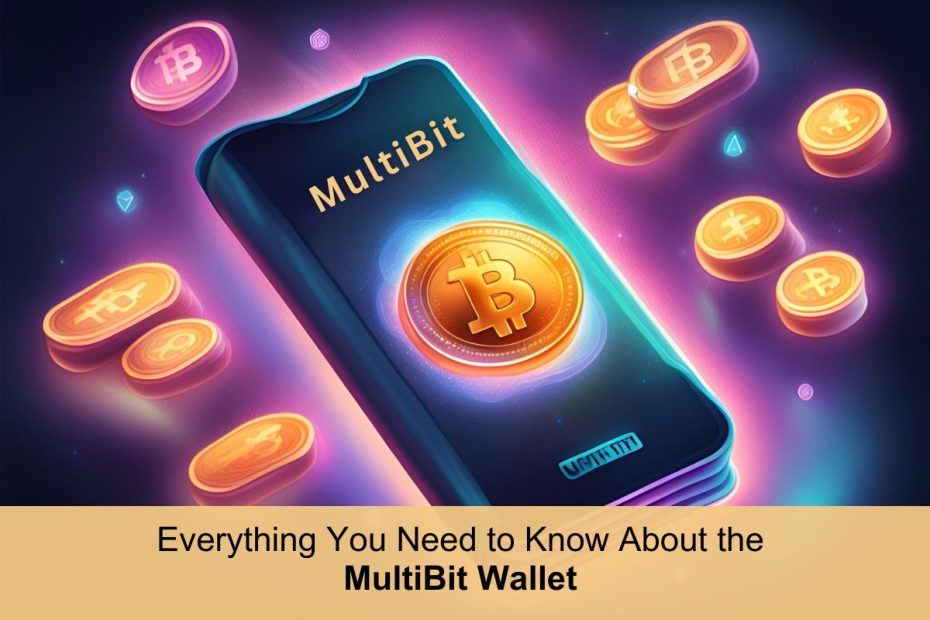Many people who got into crypto in the early 2010s used a MultiBit Wallet at some point. It was a lightweight wallet that didn’t require the entire blockchain to work like the old version of Bitcoin Core did. This made it one of the most attractive options for Bitcoin (BTC) HODLers before it was discontinued in 2017.
MultiBit has since been relegated to the chronicles of crypto history.
Nonetheless, considering the important role it played in Bitcoin’s development, and the fact that there are some people with BTC stuck in MultiBit wallets, a close examination of the application is in order.
Introduction to the MultiBit Wallet
The MultiBit Wallet was launched in April 2011. Developed for Windows, Mac, and Linux PCs, it was a lightweight alternative to wallets like Bitcoin Core, which required the user to download the entire blockchain. It also supported opening multiple wallets from the same application.
These features made MultiBit a popular application in the Bitcoin community. By the end of 2012, the wallet boasted over 50,000 monthly downloads. This number would shoot up to more than 100,000 over the next year. It peaked at more than 300,000 in early 2014 and became the number 1 Bitcoin wallet.
The project would release Version 2.0 shortly thereafter. This version introduced hierarchical deterministic (HD) wallets to the application, allowing owners to use a seed phrase.
In 2016, MultiBit was acquired by Bitcoin Startup KeepKey. A year later, KeepKey announced it would be discontinuing MultiBit to focus on its hardware wallet, advising users to transfer their assets to other software wallets.
So, why was a successful wallet discontinued?
In a GitHub update, KeepKey CTO Ken Hodler outlined that MultiBit’s code was in a poor state. It had ‘stubborn bugs’ that caused users a lot of trouble. One user, for instance, reported that a bug cost them their BTC. Such glitches needed a lot of work to fix.
Bitcoin was also undergoing some fundamental changes that left MultiBit’s software relatively outdated. To serve users effectively, the wallet needed rebuilding from the ground up. KeepKey lacked the resources for such an endeavor. So in 2017, they decided to discontinue MultiBit.
MultiBit Classic vs MultiBit HD
Two versions of MultiBit were built before its discontinuation, MultiBit Classic and MultiBit HD.

MultiBit Classic
MultiBit Classic is the original version launched in 2011. It was built on BitcoinJ, an open-source Java-based library for Bitcoin that allowed the wallet to implement simplified payment verification. This enabled users to send and receive Bitcoin without running a full network node.
It’s evident that MultiBit was committed to user experience (UX) from the get-go. It was even one of the first BTC wallets to have multi-language support. This UX-focused path ultimately led to the release of MultiBit HD in 2014.
MultiBit HD
In addition to security and privacy improvements, MultiBit HD had one key feature over MultiBit Classic: it was a hierarchical deterministic (HD) wallet. This wallet allows for the generation of multiple addresses and private keys from a single root key. The root key is then given to you as a single seed/recovery phrase, allowing you to back up and restore your wallet at will.
MultiBit Classic users didn’t get a seed phrase. They just got their keys in raw form, making the seed phrase in MultiBit HD a significant security and convenience upgrade. The new version also included a contact list that you could add someone’s name and address to; just like an addressbook has a contact’s name and phone number.
These were major features and explain why MultiBit was such a popular Bitcoin wallet at the time. Inspired by the lightweight application, a group of developers built MultiDoge by porting the MultiBit client to Dogecoin. MultiDoge exclusively supports DOGE and remains operational today.
MultiBit Wallet vs Modern Wallets
MultiBit was an excellent wallet from 2011 – 2015. It was one of the lightest and easiest-to-use applications of its time and made an important contribution to Bitcoin’s history. However, it would struggle to hold a candle to modern software wallets like Exodus, Rabby, Trust Wallet, Electrum, Metamask, etc.
Today, the average software wallet supports multiple coins (BTC, ETH, DOGE, SOL, etc.) and asset types (coins and NFTs) and can connect to different networks and protocols. MultiBit only supported Bitcoin.
Furthermore, modern wallets adhere to higher standards of security and stability. They are far more stable and less likely to be exploited than MultiBit, which eventually shut down due to bugs.

MultiBit Wallet Recovery in 2025
It’s been 8 years since MultiBit was discontinued. Some users, however, still have MultiBit wallets with BTC in them. So, how do you go about recovering a MultiBit Wallet in 2025?
If you still have access to the app, you’ll need to export the private keys. This can be done directly from the GUI. Once you have your keys, you can simply import them to Electrum or Bitcoin Core.
If you don’t have the app, you’ll need to locate your wallet or keys. These can be found in the folder location:
- Windows: %APPDATA%\MultiBit
- Mac: ~/Library/Application Support/MultiBit
- Linux: Look for a folder called multibit
You’ll find several encrypted files ending with .key and .wallet. The .key file contains a single key while the .wallet file holds multiple private keys and a mnemonic (for MultiBit HD wallets). To reach them, you have to decrypt your .wallet or .key files.
These files have been encrypted with whatever password you’d set to secure your wallet. You’ll need this password and OpenSSL to reach your keys. This is an open-source software library that provides tools for many functions, among them encryption and decryption. But what if you don’t have your password?
Several free online tools can help you recover your password. These include BTC Recover, John the Ripper, and Hashcat. However, they’ll only be helpful if you have a good sense of what the password could be.
If you still can’t recover your MultiBit private keys, your last option is a crypto wallet recovery service. This is a service run by an IT professional to help people recover their crypto wallets. Since it’s done by an expert, it gives you the best chance of recovering your MultiBit Wallet.
In Need of Quick and Efficient MultiBit Wallet Recovery?
If you’ve lost access to your MultiBit Classic or HD wallet, Professional Crypto Recovery can help you recover it. PCR is a firm owned and operated by Julia Burlingham, an expert with 20+ years in IT.
Over the years, she has helped clients from all around the world regain access to their crypto wallets – including discontinued applications like MultiBit – through quick, secure, and affordable recovery services.
Get in touch to recover your MultiBit Wallet now.
FAQs
Does MultiBit Wallet Still Work?
Officially, no. Support for the MultiBit Wallet ceased in 2017. KeepKey, the startup that owned MultiBit at the time, discontinued the product, citing stubborn bugs and outdated software that required more resources to fix than they had at the time.
Can You Still Use MultiBit?
It’s possible to get MultiBit to run on your computer. Its code was open source and can still be found on GitHub. However, using it is not recommended since the software is significantly outdated at this point. It is also unsupported, so running it comes with severe security risks.
Is MultiBit Safe to Use?
No. Using MultiBit in 2025 is risky because the wallet is outdated and unsupported, making it extremely vulnerable to malware and other exploits.
